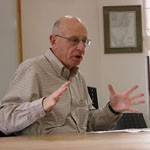
JERUSALEM — So far, no agreement on a government.
There is argument about who will get which ministry. So far, no politician wants to be Health Minister.
Perhaps those having to decide are waiting for the Supreme Court to make its decision. There remains a chance that it’ll veto the choice of Bibi as Prime Minister, given the three indictments against him.
The law protects a Prime Minister from being unseated by an indictment. But it is silent on the issue of appointing a sitting Prime Minister to continue as Prime Minister when a new government is being formed.
Bibi has spoken forcefully against the Court, relying on the populist argument. He claims a majority of supporters throughout the country. That’s not correct. Even with his block of right wing parties, he’s short of a majority. And a substantial number of Likud voters have indicated their preference of someone else.
The Attorney General has advised the Supreme Court that there is no legal justification to deny the Prime Minister’s Office to Netanyahu. That may not end the Court’s deliberation, but it puts a weight against vetoing Netanyahu.
Who wants to be responsible for calling another election, this time without Bibi? Would it produce anything other than another tie? With neither major party having a clear majority in the Knesset?
Betting is that the Court will avoid unseating Bibi, but may take a negative posture on some of the laws passed as part of the coalition agreement.
Bibi’s a complex figure. A master politician, who speaks as a right wing radical, but operates as a moderate. Illustrating this is the issue of absorbing West Bank settlements. He speaks in favor, but has never pushed the issue to a decision. Also with respect to Gaza. He threatens dire action, but has always decided moderately.
There is no doubt that Israel is greater than its Prime Minister. But the Prime Minister ought not to be dismissed as an important actor.
Bibi has been Prime Minister longer than any other figure, and has developed decent relationships with a number of foreign leaders. While he can’t be assigned responsibility for acquiring all the equipment of the IDF and other security forces, he’s been somewhere in the mix of individuals working to provide a wide range of equipment that has figured in Israel’s military advantages.
He also seems to have been involved in what’s labeled as the 3000 case, dealing with agreements with Germany and ThyssenKrupp to produce submarines. While Bibi has been excluded from the indictments, he was prominent in a decision allowing ThyssenKrupp to produce an advanced vessel for Egypt. And perhaps in the complexities of moving from a South Korean to a German supplier, along with many other issues in a judicial case that has not moved forward.
Bibi has also been prominent, but far from alone, in deciding how to deal the opening of this but not that, and the issue of primary schools and kindergartens, under the influence of the coronavirus.
We’re at the stage where people have to cope. What my psychologist daughter taught me years ago, how people must make do in the absence of clear lines.
There’s been plenty of politics in what’s open, especially in the case of IKEA, but not yet shopping centers. And there’ll be more wondering when schools open, and people have to decide how to handle the kids when some are learning Sunday, Tuesday, and Thursday, and others Monday, Wednesday, and Friday.
Kindergarten teachers have threatened to avoid opening if the government does not aid them for the period of forced closure. They are joining other independents in demanding help.
There’s also politics affecting how the police handle ultra-Orthodox extremists, intent on grouping for prayer, study, or funerals. The police break up the crowds, usually amid the throwing of stones at them. The few actually arrested are usually released after a few hours, and there’s no arrest of their rabbis who urge them on.
A court has come out against extending the appointment of a temporary state prosecutor, thereby siding with the Attorney General who has opposed that appointment by the Justice Minister.
Mayor Bill de Blasio of New York, caused a problem when he criticized “Jews” for the mass congregating of ultra-Orthodox for the funeral of a senior rabbi. He soon corrected himself, and focused only on the Haredim. They operate like some of their colleagues in Israel, seemingly oblivious to rules set by the government against massing together for prayer, study, a funeral, or simply to crowd their streets.
There are several indications that Israel’s experience with coronavirus has been about the best in the world. It may have something to do with the young population, as well as the strict policy of closing the country, especially on several holidays. Israeli deaths have been almost 1.5 percent of those ill, while the world wide average is more than 7 percent dead of those ill, with the US score at almost 6 percent.
The number of Israelis who have been cured of coronavirus exceeds by more than 1,700, and almost 25 percent, those who are currently ill.
Israel is venturing on an opening of schools, with strict controls on class sizes, for grades 1-3, and indicating that shopping malls and gyms will be open soon..Later will come restaurants, bars, and theaters. Operators of the stalls in various markets protest having to wait for two weeks, and are threatening to open this week.
Currently, with school classes limited to 17, rather than the usual 35, those who usually teach higher grades have been recruited to help. But what will happen when the higher grades return to school? And where will all the classes fit in existing buildings?
Lots of confusion.
*
Ira Sharkansky, PhD, is professor emeritus of political science at Hebrew University. He may be contacted via ira.sharkansky@sdjewishworld.com